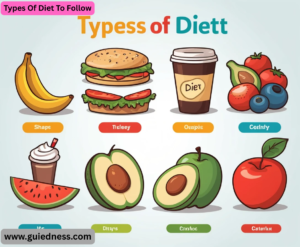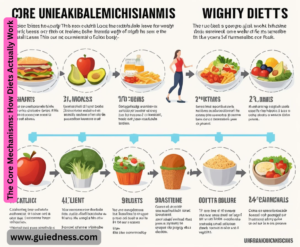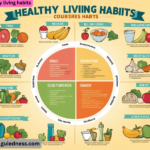Types Of Diet To Follow Of course! Here is a comprehensive guide to the most popular and well-regarded types of diets, categorized by their primary goal or philosophy.
Important Disclaimer First:
Always consult with a healthcare professional, registered dietitian, or doctor before starting any new diet. What works for one person may not work for another due to individual health conditions, metabolic differences, and lifestyle needs.
Categories of Diets
- Diets can be broadly grouped into several categories based on their core principles:
- Weight Loss Diets: Focus primarily on creating a calorie deficit.
- Plant-Based Diets: Emphasize foods derived from plants.
- Low-Carb & Keto Diets: Restrict carbohydrates to varying degrees.
- Health-Focused & Medical Diets: Designed to manage specific health conditions.
- Lifestyle & Philosophical Diets: Based on a set of ethical or holistic principles.
Weight Loss Diets
- Types Of Diet To Follow These diets are designed primarily for fat loss, often by controlling calorie intake or meal timing.
Intermittent Fasting (IF):
- What it is: Not about what you eat, but when you eat.
- Popular Methods: 16/8 (fast for 16 hours, eat within an 8-hour window), 5:2 (eat normally for 5 days, restrict calories to 500-600 for 2 non-consecutive days).
- Pros: Can simplify calorie control, may improve metabolic health.
- Cons: Can be difficult to sustain; may not be suitable for everyone (e.g., those with diabetes or a history of eating disorders).
Calorie Restriction / Calorie Counting:
- You track your daily calorie intake to ensure it’s lower than what you burn.
- Popular Methods: Using apps like MyFitnessPal, Lose It! to log food.
- Pros: Flexible—no foods are off-limits. Teaches portion control.
- Cons: Can be tedious to track; doesn’t always account for food quality (e.g., 100 calories of soda vs. 100 calories of broccoli).
- The Mediterranean Diet (Often ranked #1 for overall health):
- What it is: Based on the traditional eating patterns of countries bordering the Mediterranean Sea.
- Focus: Abundance of fruits, vegetables, whole grains, legumes, nuts, seeds, and olive oil. Moderate amounts of fish, poultry, and dairy. Rare consumption of red meat and sweets.
- Pros: Extremely heart-healthy, supported by extensive research, sustainable and enjoyable.
- Cons: Can be more expensive due to fresh produce and high-quality fats.
Plant-Based Diets
- These diets prioritize plant sources but exist on a spectrum of animal product exclusion.
Veganism:
- What it is: Excludes all animal products: meat, dairy, eggs, honey, and gelatin.
- Focus: Fruits, vegetables, grains, nuts, seeds, and legumes.
- Pros: Strong ethical and environmental components. Linked to lower risk of heart disease.
- Cons: Requires careful planning to avoid deficiencies (e.g., Vitamin B12, Iron, Calcium).
Vegetarianism:
- What it is: Excludes meat (red meat, poultry, seafood). Several subtypes:
- Lacto-ovo: Eats dairy and eggs (most common).
- Lacto: Eats dairy but not eggs.
- Ovo: Eats eggs but not dairy.
- Pros: Flexible, easier to follow than veganism.
- Cons: Still requires attention to iron and B12 intake.
Flexitarian:
- What it is: A primarily vegetarian diet that occasionally includes meat or fish.
- Focus: “Flexible vegetarian.” The goal is to eat more plants without strict elimination.
- Pros: Very sustainable and non-restrictive. A great entry point to plant-based eating.
- Cons: Lacks clear guidelines, which can lead to overconsumption of processed foods if not careful.
Low-Carb and Keto Diets
- These diets significantly reduce carbohydrate intake, forcing the body to use fat for fuel.
- Ketogenic (Keto) Diet:
- What it is: A very high-fat, very low-carb, moderate-protein diet designed to put the body into a metabolic state called ketosis.
- Macros: Typically 70-80% fat, 15-20% protein, 5-10% carbs (often <50g net carbs per day).
- Pros: Can lead to rapid initial weight loss, reduces appetite, used therapeutically for epilepsy.
- Types Of Diet To Follow Cons: Restrictive, can cause “keto flu” (initial side effects like headache and fatigue), long-term sustainability and health effects are still debated.
Low-Carb Diet (e.g., Atkins, South Beach):
- What it is: A broader category than keto. Focuses on reducing carbs but not necessarily to the extreme of inducing ketosis.
- Focus: Prioritizes protein, healthy fats, and non-starchy vegetables over sugars and starches.
- Pros: Can be effective for weight loss and blood sugar control.
- Cons: May limit fiber intake if not careful with vegetable choices.
. Health-Focused & Medical Diets
- These diets are often recommended by doctors to manage specific conditions.
- DASH Diet (Dietary Approaches to Stop Hypertension):
- What it is: Developed to prevent and lower high blood pressure.
- Focus: Rich in fruits, vegetables, whole grains, and lean proteins; very low in sodium, sugar, and saturated fat.
- Pros: Highly effective for heart health, well-researched, balanced.
- Cons: Requires reading labels to monitor sodium intake.
MIND Diet:
- What it is: A hybrid of the Mediterranean and DASH diets, specifically designed to support brain health and reduce the risk of Alzheimer’s disease.
- Focus: Emphasizes berries, leafy greens, nuts, whole grains, and fish.
Gluten-Free Diet:
- What it is: Essential for people with celiac disease or gluten sensitivity. Eliminates the protein gluten found in wheat, barley, and rye.
- Pros: Medically necessary for some.
- Cons: Not inherently healthier for those who don’t require it.
Lifestyle & Philosophical Diets
Paleo Diet (The “Caveman” Diet):
- What it is: Based on the idea of eating what our Paleolithic ancestors presumably ate.
- Focus: Meat, fish, eggs, vegetables, fruits, nuts, and seeds. Excludes grains, legumes, dairy, and processed foods.
Pros: Eliminates processed foods and sugars.
- Cons: Restrictive, eliminates healthy food groups like whole grains and legumes.
- Whole30:
- What it is: A very strict 30-day elimination diet designed to reset eating habits and identify food sensitivities.
- Eliminates: Sugar, alcohol, grains, legumes, dairy, and additives.
- Pros: Can help identify food intolerances and break unhealthy cravings.
- Cons: Extremely restrictive, not meant to be a long-term lifestyle.
Beyond the Basics: Other Notable Dietary Patterns
- Here are more diets that don’t neatly fit into a single category or are newer trends:
- The Carnivore Diet:
- Types Of Diet To Follow What it is: An extremely restrictive elimination diet that consists exclusively of animal products: meat, fish, eggs, and limited dairy. It eliminates all plant foods.
- Claimed Benefits: Followers report reduced inflammation, simplification of eating, and resolution of autoimmune issues. However, these are largely anecdotal.
- Significant Considerations: It is highly controversial from a nutritional standpoint. There are major concerns about the lack of fiber, vitamins, and antioxidants found in plants, and the potential long-term impact of very high saturated fat intake on heart health. Not recommended without strict medical supervision.
Pescetarianism:
- What it is: A vegetarian who also eats fish and seafood.
- Focus: All plant foods, plus a focus on omega-3-rich seafood as the primary protein source.
- Pros: Offers the health benefits of plant-based eating with the added cardiovascular and brain health benefits of fatty fish. Often seen as a stepping stone to vegetarianism or a more sustainable long-term option.
The Volumetrics Diet:
- What it is: A strategy focused on eating foods with high water and fiber content, which are low in calorie density but high in volume. This helps you feel full on fewer calories.
- How it works: Categorizes food into four groups based on calorie density. Encourages loading up on Category 1 (very low-density: non-starchy fruits & veggies, broth-based soup) and Category 2 (low-density: starchy fruits, grains, low-fat protein) while limiting Category 3 (medium-density: meat, cheese, refined carbs) and Category 4 (high-density: chips, candy, nuts, butter).
Pros: Very effective for satiety and sustainable weight loss without forbidding any foods.
The Mayo Clinic Diet:
- What it is: A behavior-based program designed to be a lifelong lifestyle change, not a quick fix. It uses a food pyramid that prioritizes fruits, vegetables, and whole grains.
- How it works: Starts with a two-week “Lose It!” It then moves into the “Live It!” phase for sustainable habits.
- Pros: Focuses on habits and psychology, is balanced and nutritionally sound.
The Core Mechanisms: How Diets Actually Work
- Despite their vast differences, most effective weight-loss diets work through one or both of these fundamental mechanisms:
Calorie Deficit (The Unbreakable Rule):
- This is the non-negotiable foundation of weight loss. You must consume fewer calories than your body burns.
Different diets achieve this in different ways:
- Directly Counting: Calorie counting diets make the deficit explicit.
- Macronutrient Manipulation: Keto and low-carb diets use high protein/fat to promote satiety (fullness), making you naturally eat less. They also eliminate high-calorie processed carbs.
- Food Restrictions: Paleo, Vegan, and Whole30 eliminate entire categories of high-calorie foods (e.g., processed foods, sugars, grains), making a calorie deficit more likely.
- Time Restriction: Intermittent Fasting limits the window of time you can eat, which often leads to consuming fewer total calories.
Improving Food Quality:
- Types Of Diet To Follow This is the key to health, not just weight. Swapping processed, calorie-dense, low-nutrient foods for whole, nutrient-dense foods improves metabolic health, hormones, and energy levels.
- This is the core principle behind diets like Mediterranean, DASH, and MIND.
How to Choose: A Practical Framework
- Instead of asking “What’s the best diet?”, ask “What’s the best diet for me?” Follow these steps:
- Define Your “Why”: Be specific.
- Is your primary goal weight loss, managing a health condition (e.g., high blood pressure, PCOS), improving energy, ethical concerns, or simply feeling better?
- Your goal will immediately narrow the field. (e.g., DASH for hypertension, Low-Glycemic for PCOS, Mediterranean for overall health).
Audit Your Lifestyle Honestly:
- Cooking: Do you love to cook or rely on takeout? (Meal-prep heavy diets like Keto may not suit someone who hates cooking).
- Social Life: How will this diet affect dinners out, family meals, and social events? (Extremely restrictive diets can be socially isolating).
- Budget: Can you afford the staples of the diet? (Grass-fed meat for Paleo/Keto, fresh organic produce for Mediterranean/Vegan can be expensive).
- Temperament: Do you thrive on strict rules (Keto, Whole30) or prefer flexible guidelines (Mediterranean, Flexitarian)? Do you have a






